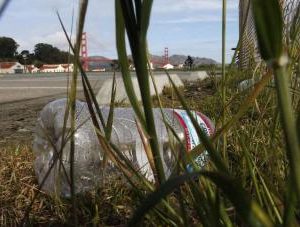The National Park Service announced Wednesday that, effective immediately, it will no longer allow parks to ban the sale of plastic water bottles, which have long been criticized for littering lakes and forests.
Since 2011, as part of the Green Parks Plan adopted under former President Barack Obama, the Park Service has encouraged the use of tap water and refillable bottles on federal lands, while allowing parks the option to prohibit the sale of disposable water bottles in shops, hotels and vending machines.
Opponents of the effort, including powerful industry groups, say repeal was long overdue. The initiative never achieved its desired benefits, they said, and allowed the continued sale of other bottled beverages like soda, which are typically less healthy than water.
“Consumption of water in all forms, tap, filtered, and bottled, should always be encouraged,” said Jill Culora, a spokeswoman for the International Bottled Water Association, a trade group. “The rescinded policy was seriously flawed.”
The policy, according to a Park Service memo, sought not only to reduce the environmental footprint of plastic by limiting litter and curtailing high disposal costs, but also to embrace the environmental “symbolism.”
While none of the 23 parks that implemented bans are in California, the Bay Area’s Golden Gate National Recreation Area had been eyeing such a policy.
Advocates of the bans called Wednesday’s action another move by the president to put business before the environment.
Like other federal agencies, the Department of the Interior, which oversees the park service, has come under fire for the president’s appointment of people with ties to industries affected by agency regulations.
Deputy Interior Secretary David Bernhardt, who was confirmed in June, previously spent eight years as an attorney at the Denver law firm Brownstein Hyatt Farber Schreck, whose clients include water bottler Nestle.
“Just as we’ve seen across the board with the Trump administration, this is an example of the industry working behind the scenes to protect its profits,” said Lauren DeRusha Florez, associate campaign director at Corporate Accountability International, a national nonprofit group that advocates sustainable business practices. “Plastic water bottles have a tremendous environmental impact.”
The beverage industry has for years lobbied the federal government for the policy change, and several members of Congress recently joined the chorus.
The National Park Service said an internal review concluded that it didn’t make sense to sell soda and other sugary drinks while barring water.
“We determined that park visitors can best choose how to keep themselves and their family hydrated when visiting a national park,” said parks spokesman Jeremy Barnum.
Supporters of the ban suggested that perhaps a better solution would be to target soda bottles as well. Parks that initiated bans, including the Grand Canyon in Arizona, Canyonlands in Utah and Mount Rainier in Washington state, boosted the number of water-filling stations for reusable bottles.
“The choice between sugary drinks and bottled water is a false choice,” DeRusha Florez said. “The truth is that what this policy had done is increase access to free tap water and make available reusable water bottles.”
###







